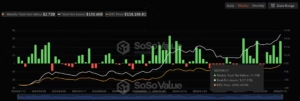The U.S. stock market faced a mixed end on Wednesday amid a concerning private payroll report and a cautious outlook from the Federal Reserve’s Beige Book. This shift has raised significant worries about economic growth, inflation rates, and the persistent impact of tariffs on businesses across the nation.
The Dow Jones Industrial Average concluded its four-day winning streak with a decline of 91.90 points, representing a 0.22% loss. Conversely, the S&P 500 remained nearly unchanged while the Nasdaq Composite saw a modest increase of 0.32%, settling at 19,460.49.
The market sentiment was notably dampened by a disappointing ADP employment report that disclosed a rise of only 37,000 in private payrolls for May, a figure that fell significantly short of expectations. This underwhelming statistic, compounded by the upcoming nonfarm payrolls data release, may compel the Federal Reserve to consider an interest rate cut.
In addition to the poor employment data, the yield on the 10-year Treasury fell to 4.349%, representing its lowest value since early May. The Fed’s Beige Book further exacerbated concerns by indicating a slight decline in U.S. economic activity over the preceding six weeks.
It detailed how hiring activities remained stagnant as many business owners hesitated to implement expansion plans, primarily due to heightened policy uncertainty from Washington and rising costs associated with tariffs. The report drew attention to tariffs, which were mentioned 122 times, indicating a marked rise from 107 in April.
Across different regions, businesses in New York and Philadelphia reported increases in input costs, leading to fears of reduced profit margins. Many firms are left with the daunting choice of passing these costs onto consumers to maintain their margins. Areas like Boston, New York, and Philadelphia recorded declines in activity, while regions including Richmond, Atlanta, and Chicago experienced modest growth. Nonetheless, the Fed concluded that even in more robust districts, hiring activities remained cautious, reflecting the overall apprehensive economic climate.







